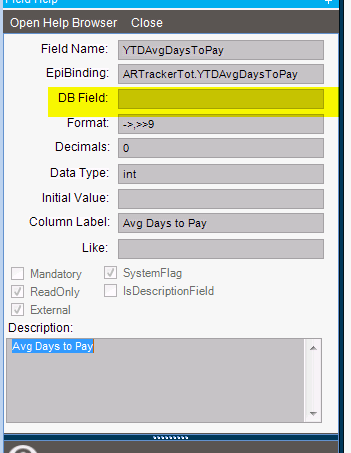Machzy
(Mach Zreik)
1
I’ve created a customer BAQ that lists off a bunch of customer information, but Finance has asked if this field can be added to the BAQ.
Is there any way to find out how Epicor calculates this field? or is there any way to use this field in a BAQ?
Thanks.
ckrusen
(Calvin Krusen)
2
That value must be calculated from a view or something, as it is not stored in a DB table.

You could make a Sub-query to calculate it, and reference that in your BAQ.
This might sound dumb, but what exactly is the definition of average time to pay?
- If invoiced on 6/1 and payment is received 6/11, it would be 10 days.
- What if they payed 25 % on 6/5 and the remaining on 6/11? Is that still 10 days? Or something less, like 25% x 4 days + 75% x 10 days = 8.5 days?
- How to handle unpaid invoices? Ignore them? Assume they will be paid tomorrow?
amaragni
(al maragni (USA - NY/NJ))
3
was this ever determined? (epicor calculation)
mnemec
(Michael Nemec)
4
We used the following calculated field and compared against Epicor calculation:
sum(convert(int, datediff(day, InvcHead.InvoiceDate, CashDtl.TranDate)))/count(Customer.CustID)
No differences noted yet.
amaragni
(al maragni (USA - NY/NJ))
5
MICHAEL
thanks for the follow up
can i ask, does this sample set include any OnAccount payments or CM applications?
ty
A.Baeisa
(Al)
6
if you happy with what Epicor calculate in this view, capture it and save it in any UD filed then you can call it when ever you want.
Example
Jonathan
(Jonathan)
7
As michael mentioned, this is the sum of days between the last CashDtl.TranDate and the InvcHead.InvoiceDate divided by the amount of invoices paid.
It looks at posted InvcHead records so it should include credit memos and unapplied payments.

